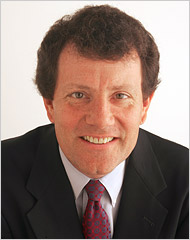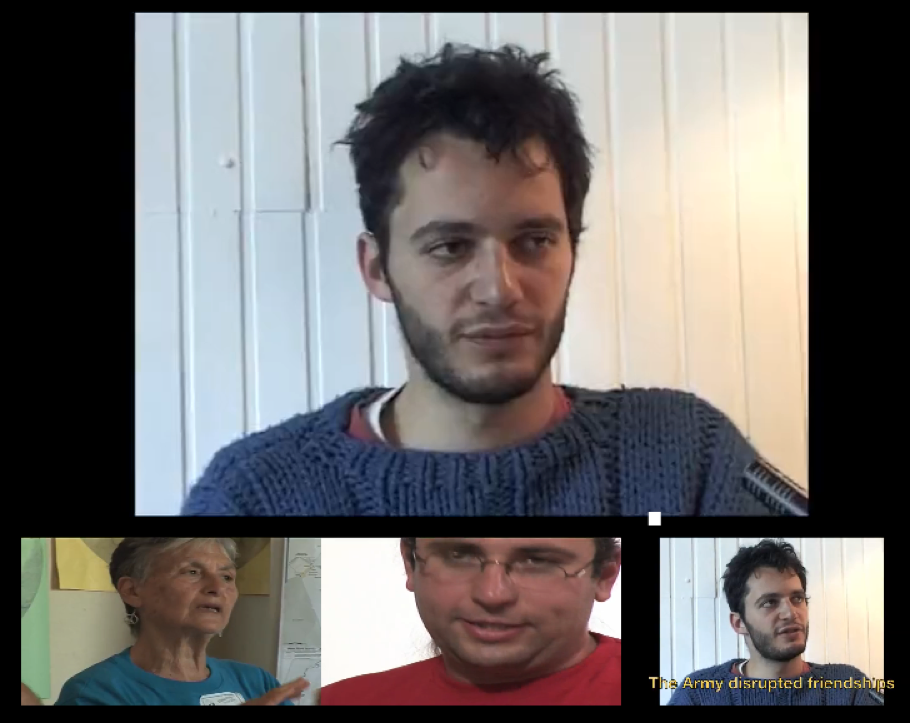The Only Democracy? » On The Ground Reports » Note to Kristof: Palestinians don’t need Israeli tutelage with nonviolent protest
Note to Kristof: Palestinians don’t need Israeli tutelage with nonviolent protest
by Ofer Neiman

A popular colloquial expression in Hebrew regards the futility of “selling ice to an Eskimo”. Perhaps the New York Times’ Nicholas Kristof should take note. In a recent blog entry, Kristof wrote that “Israeli civil society promotes democratic values in Palestinian communities”, and that “…the weekly Sheikh Jarrah protests in East Jerusalem, in which Israeli Jews play a major role, offer a useful model of peaceful protest”. Unfortunately, Kristof presents a patronizing and misinformed view of the history of the Palestinian struggle against Israel’s policies of land grab and occupation.
It is true that some Palestinians, especially former prisoners who have risen to leadership roles, openly state that they have learned a lot about Israeli society during their imprisonment, and these people sometimes praise the Israeli elections and the parliamentary debates which they have witnessed. But their keen observation of Israeli political processes is by no means a starry eyed appeal for an Israeli education on human rights and non-violent civil disobedience. There are several reasons why they do not need to hear the Kristof line from us. The main reason, and one wonders whether Kristof is at all informed on this issue, is the fact that inspirational non-violent Palestinian campaigns against Israel’s policies have been around for years, and these campaigns have been initiated and led by…Palestinians!
Palestinian community leader Dr. Haidar Abdel-Shafi, a respected Gaza based physician needed no peacenik-Israeli guidance in 1967 when he voiced his opposition to the Israeli occupation of the Gaza strip. Moshe Dayan, Israel’s Minister of Defense at the time, arrested him and then expelled him from Gaza to Sinai and then to Lebanon (such deportations are prohibited according to the humanitarian principles of the Geneva conventions, by which Israel has promised to abide). Abdel-Shafi was not alone in his actions. A non-violent Palestinian effort to protest against Israeli repression was met with military brutality: “As General Shlomo Gazit, the Coordinator of Activities in the Occupied Territories at the time, points out in his book The Carrot and the Stick, the message Israel wanted to convey was clear: Any act of resistance would result in a disproportionate response, which would make the population suffer to such a degree that resistance would appear pointless.” (Quote taken from Dr. Neve Gordon’s recommended article from December 2009)
Another important episode in the history of Palestinian non-violent resistance was the campaign led by International human rights and children’s rights activist, Dr. Mubarak Awad, a Palestinian living in exile in the US. Nicknamed “The Palestinian Gandhi”, Awad established the Palestinian Centre for the Study of Nonviolence in 1985, after returning to the Occupied Territories on an Israeli tourist visa. Among the tactics employed by Awad and his fellow Palestinian activists was the planting of olive trees on proposed Israeli settlements, asking people not to pay taxes and encouraging people to consume Palestinian products (an action which even the co-opted Palestinian Authority has now embraced to some extent, by banning the selling of settlement products). And what was the fate of Awad? In 1988 he was detained and then deported. Israel’s High Court of Justice, a beacon of justice and democracy in the eyes of some prominent US jurors, approved the decision. Even the NY Times got it right at the time:
For moral and practical reasons, it is regrettable that Israel’s High Court of Justice could find no reason to overrule the deportation of Mubarak Awad, a Jerusalem- born American citizen. The ruling suggests that Israel, made frustrated by the uprising in the occupied West Bank and Gaza, is having trouble drawing the line between civil disobedience and armed rebellion.
Another inspiring Palestinian campaign was the May 1988 tax revolt in Beit Sahour, under the most American of slogans, “No Taxation without Representation”. The revolt, a courageous act of non-violent Resistance, was brutally crushed by Israel. Residents were beaten, detained without trial, households were raided and their content was confiscated (Israel’s way of collecting tax…). The goods, including children’s toys, were auctioned off in Israel. Israel’s Defense Minister at the time (his name, by the way, was Yitzhak Rabin) said that he would break the Beit Sahour tax revolt at all costs, even if it meant keeping the town under curfew for two months. Without taking away from the efforts of a few respectable Israeli NGO’s and some dedicated Israeli activists, who tried to assist, finding a mainstream Israeli leftist (of the Peace Now type) in uniform, patrolling the streets of Beit Sahour (albeit reluctantly), was more probable than finding him standing at the entrance to a house, trying to prevent the state sponsored plundering which was taking place.
Palestinian non-violent resistance is alive and kicking today as well, in the struggle against the construction of new settlements and the rapacious separation wall built by Israel to grab as much land as possible (Shaul Arieli of the Geneva initiative has demonstrated that a alternative path that does not cut through Palestinian land would have been much easier to construct, and just as suitable for Israel’s proclaimed security considerations). And at this moment, as Kristof speaks and writes, Palestinian grassroots activists are paying a very heavy price for their efforts. More and more Palestinians are joining various demonstrations and actions against the occupation, but the risks are high, including the risk of injury or even death at an unarmed rally. It seems safe to assume that grassroots Israeli actions to stop this policy and bring the perpetrators to justice will serve the campaign better than telling the Palestinians what they already know.
Israelis should not go to Sheikh-Jarrah in order to educate the “heathen” as to the merits of civil disobedience. Israelis who attend protests at Sheikh-Jarrah, are privileged citizens in an apartheid state, and they are simply following the elementary dictates of conscience. The Palestinians have no need for Israeli civil disobedience tutoring. They are in need of Israeli solidarity with their just struggle.
UPDATE: (Ed.) Kristof continues writing about the issue on his blog, and continues to accuse Palestinians of being ignorant of nonviolence.
Filed under: On The Ground Reports








 “You have a choice! Israeli Anti-Militarists Speak”
“You have a choice! Israeli Anti-Militarists Speak”